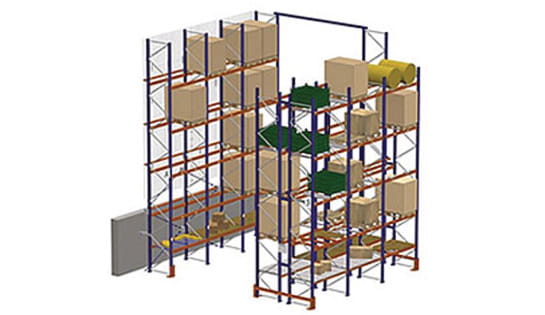-

Pallet Racking and Pallet Storage
Pallet racking and pallet storage are key areas of expertise for us at Arbor Material Handling. Our warehouse storage experts can provide a full suite of options that can improve process and throughput in your facility, whether you're located in Philadelphia, Delaware or New Jersey. Our warehouse storage consultants serve the whole tri-state area. We can do a full analysis of your warehouse needs and provide an optimized pallet storage plan that is both cost effective, space efficient and provides the key pallet racking materials that you’ll need to do the job. Below is an overview of the range of racking and pallet storage solutions that Arbor can provide its customers. If you require alternate or additional pallet and storage rack options, we have the ability to provide what you need. Contact us directly and we'll make every effort to accommodate your requests.
-

Selective Rack
Select Rack - Single Selective Racking - Standard Rack: The “selective” pallet rack is the most common in the materials handling industry. These racks provide 100% selectivity and accommodate a wide variety of load types. It is the lowest cost per unit stored. This type of rack can be used with virtually any type of forklift equipment. Using Deep-Reach forklift trucks and Swing-Reach forklifts with this type of rack can increase storage density dramatically. -

Double Deep Pallet Racking
Double deep pallet rack uses selective rack configured so one pallet is stored behind another up to two pallets deep. This requires a special forklift that is only slightly more expensive than a regular reach truck. Because one pallet is stored behind another this type of storage requires multiple pallets of the same SKU. Double deep pallet storage will increase storage density by 15-20% over selective pallet rack. -
Deep Lane Pallet Racking - Maxipacker Pallet Shuttle
Combining the ability to store 6-100+ pallets deep as high as you'd like creates incredible density while minimizing the need for fork lifts or other equipment to transport pallets. Unlike Drive-in rack there is less honeycombing and much greater selectivity. Maxipacker deep lane pallet racking can be used for LIFO or FIFO storage solutions. The most common applications for Maxipacker deep lane pallet tacking systems include the storing and transporting of time sensitive product, high volume just-in-time cross docking, and consolidation of outbound loads at shipping docks, where each lane can represent an outbound order. Originally designed for the freezer industry, Maxipacker deep lane pallet racking is now used in ambient temperatures as well.
-

Push Back Racking
When loaded this rack will look like Selective rack. However, similar type SKU pallets are placed one behind another from 2 – 7 pallets deep. Unlike Double deep rack a special forklift is not needed. Push back rack can produce even better cube utilization with less of a honeycombing effect you may experience in Drive-in rack. This type of rack has carts that the pallet rests on. As you place the second or deeper load in the forklift truck actually pushes the previously placed pallet(s) back. As pallets are pulled form the system the carts with the pallets on them will ease forward towards the aisle. This type of system is for First In Last Out (FILO) storage and is not the best for time sensitive materials. -

Cantilever Racking - Long Load Storage
This is the selective racking for long loads and is common in the materials handling industry for loads over 12' long. These racks provide 100% selectivity and accommodate a wide variety of load types. This type of racking can be used with any type of forklift equipment although space efficiency is greatly improved using a Raymond 4-D® or Raymond Sideloader forklift truck. -

Pallet Flow Racking - Deep Lane Pallet Storage
Pallet flow racking is loaded from one end and unloaded from the other. It’s best applied to storing multiple pallets of the same SKU in a high velocity operation. Pallet flow rack can store many pallets deep. Pallets flow down a slope from the loading end down to the discharge end. Because each pallet flow lane is sloped the deeper the number of pallets stored the higher the loading end of the system. Often times the flow lane depth is determined by the available vertical clearance in the building. This guarantees (FIFO) storage and is well suited for date sensitive materials.
-

Drive-in Racking
When you have an even greater number of pallets per SKU you may consider Drive-In or Drive-Thru racking. In this type of rack system the forklift truck drives into the rack structure to pick up or drop off the pallet load. By doing so you remove wasted aisle space and improve the use of the warehouse cube. Selectivity is limited to those pallet loads facing the aisle and it is very difficult to maintain a high degree of storage density in the racking structure. The difference between Drive-In rack and Drive-Thru rack is simple. Drive-in rack is accessed from one side. Drive in Rackingis accessed from one side. Drive-Thru rack can be accessed from either side and the lift equipment can literally be driven thru the system.
Pallet Rack Types
Contact Us
Have racking questions? Please complete the contact form below and a representative will contact you to discuss your questions or requests.

